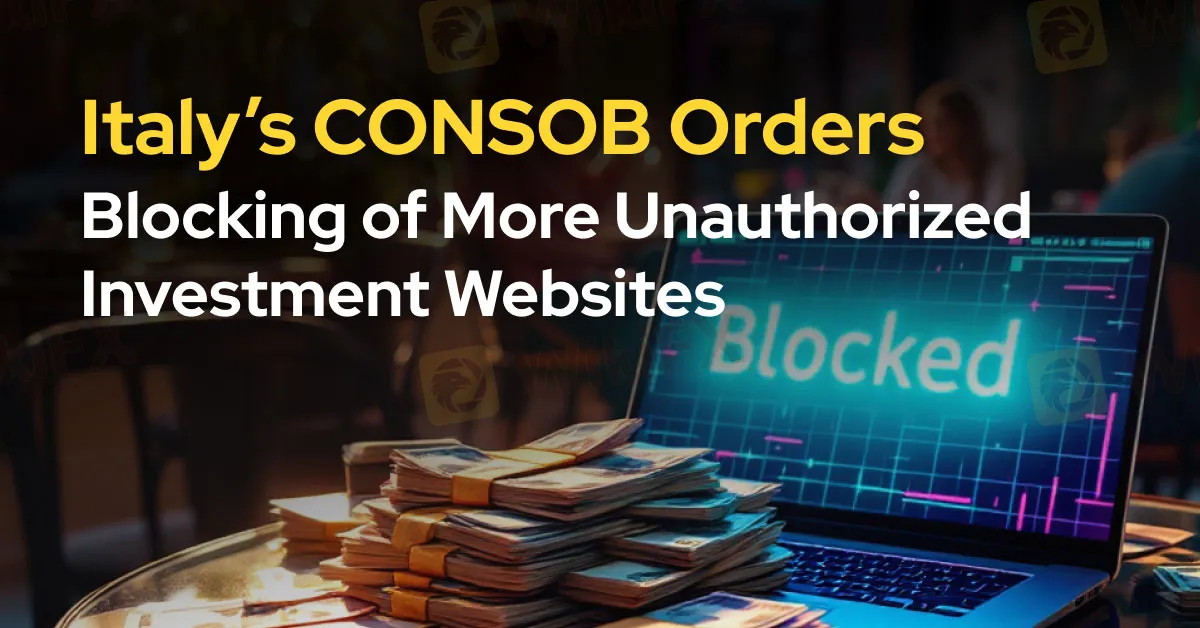简体中文
繁體中文
English
Pусский
日本語
ภาษาไทย
Tiếng Việt
Bahasa Indonesia
Español
हिन्दी
Filippiiniläinen
Français
Deutsch
Português
Türkçe
한국어
العربية
Italy’s CONSOB Orders Blocking of More Unauthorized Investment Websites
Abstract:Italy's Companies and Exchange Commission (CONSOB) has continued its efforts to crack down on unauthorized financial services by ordering the blocking of access to eight new websites offering illegal investment services. The latest action is part of a broader regulatory initiative aimed at protecting Italian investors from fraudulent operators in the financial market.

Italy's Companies and Exchange Commission (CONSOB) has continued its efforts to crack down on unauthorized financial services by ordering the blocking of access to eight new websites offering illegal investment services. The latest action is part of a broader regulatory initiative aimed at protecting Italian investors from fraudulent operators in the financial market.
Regulatory Powers Under the “Growth Decree”
CONSOBs authority to block access to unauthorized financial websites stems from the “Decreto crescita” (“Growth Decree”), introduced through Law No. 58 on June 28, 2019. Article 36, paragraph 2-tendencies of this law grants CONSOB the power to instruct Internet service providers in Italy to restrict access to websites that offer financial services without proper authorization. Since July 2019, when this law was enacted, the total number of blacked-out websites has risen to 1,152, marking significant progress in the regulator's efforts to curb illegal investment schemes.
Ongoing Blocking Process
The process of blacking out these websites by Internet service providers operating in Italy is ongoing, but it may take several days for the blocking to be fully implemented due to technical reasons. Meanwhile, CONSOB continues to monitor and take action against fraudulent operators in the market.
Investor Warnings and Resources
CONSOB urges Italian investors to exercise caution and due diligence when considering financial investments. One of the key precautions recommended by the regulator is to verify whether the operator offering the investment is authorized to provide financial services. Investors should also confirm whether a proper prospectus has been published for the financial products being offered.
To assist the public in identifying potential scams, CONSOB has provided a dedicated section on its website (www.consob.it) titled “Watch for Scams!” This resource offers valuable information and guidance to help investors avoid unauthorized financial schemes and make informed investment decisions.
Conclusion
CONSOB‘s latest actions underscore its commitment to safeguarding the financial security of Italian investors. By continuously identifying and blocking unauthorized investment platforms, the regulator aims to reduce the risk of financial fraud and promote transparency in Italy’s financial markets. Investors are encouraged to remain vigilant and utilize available resources to protect their savings from potential scams.

Disclaimer:
The views in this article only represent the author's personal views, and do not constitute investment advice on this platform. This platform does not guarantee the accuracy, completeness and timeliness of the information in the article, and will not be liable for any loss caused by the use of or reliance on the information in the article.
Read more

Bank Negara Malaysia Flags 12 New Companies for Unauthorised Activity
Bank Negara Malaysia (BNM) has updated its Financial Consumer Alert List (FCA List) by adding 12 more entities, reinforcing its efforts to warn the public against unregulated financial schemes. Check if your broker made the list!

TradingView Brings Live Market Charts to Telegram Users with New Mini App
TradingView has launched a mini app on Telegram, making it easier for users to track market trends, check price movements, and share charts.

March Oil Production Declines: How Is the Market Reacting?
Oil production cuts in March are reshaping the market. Traders are closely watching OPEC+ decisions and supply disruptions, which could impact prices and future production strategies.

How to Calculate Leverage and Margin in the Forex Market
Leverage amplifies both potential profits and risks. Understanding how to calculate leverage and margin helps traders manage risks and avoid forced liquidation.
WikiFX Broker
Latest News
The Withdrawal Trap: How Scam Brokers Lure Victims into Paying More
FCA to Investors: Think Twice Before Trusting These Brokers
Trump\s tariffs: How could they affect the UK and your money
Trump gambles it all on global tariffs he\s wanted for decades
TradingView Brings Live Market Charts to Telegram Users with New Mini App
Trump tariffs: How will India navigate a world on the brink of a trade war?
IG Group Acquires Freetrade for £160M to Expand UK Investment Market
U.S. March ISM Manufacturing PMI Released
Should You Beware of Forex Trading Gurus?
Exposed by SC: The Latest Investment Scams Targeting Malaysian Investors
Currency Calculator







